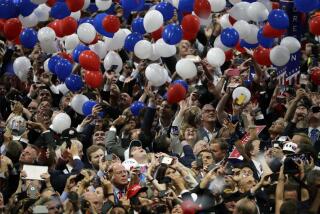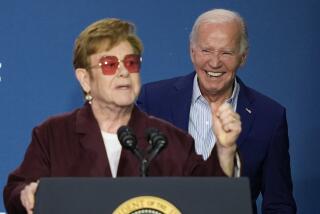Analysis: Gay marriage decision not working in Obama’s favor so far
- Share via
WASHINGTON -- It’s been one week since President Obama, prodded into action by Vice President Joe Biden’s remarks on a Sunday talk show, granted Robin Roberts of ABC News an interview in which he revealed his personal policy shift on gay marriage. Whether or not Obama’s decision, and the way it was handled politically, will make a difference on election day is still anyone’s guess — and may always be. Parsing reactions by millions of individual voters, particularly on an issue that ranks far below other concerns for most Americans, obviously involves a measure of guesswork.
That said, the first wave of polling is in, and the results aren’t looking particularly good for Obama. Taken together, four different national opinion surveys over the past week, by reputable organizations with good track records, indicate that the president’s stand could well hurt him politically. Unsurprisingly, the numbers are fairly close; but as often gets pointed out, tight elections are decided by small numbers of votes.
Perhaps the most encouraging sign for Obama comes from a new ABC/Washington Post poll, which found that independent swing voters had a slightly more favorable than unfavorable view of his position (though the results were a statistical tie, given the margin of error for that subgroup). ABC’s analysis, by statistician Damla Ergun of Langer Research Associates, pointed out that independents who reacted most strongly to the decision tilted against it, and that “strong sentiment can better predict voter turnout and vote preferences.”
A Gallup poll found that the overall change in public opinion was a” net minus” for Obama, though the organization cautioned that these results could change, depending on the degree to which same-sex marriage is, or is not, a campaign issue in the fall.
The latest New York Times/CBS poll showed that 26% of voters were less likely to support Obama as a result of his announcement, compared with 16% who said they were more likely to support him. But the small overall sample size and the lack of any valid sub-group data make those numbers fairly useless for purposes of predicting voter behavior. The poll did find, however, that a clear majority of Americans regarded Obama’s declaration of support for same-sex marriage as largely a political move, which doesn’t help him at all.
A fourth poll, by the independent Pew Research Center, found that 25% of Americans felt less favorably toward Obama, while 19% felt more favorably, as a result of his shift. But among independents, there was no measurable change. Nineteen percent regarded him more favorably, 19% less favorably, and 60% said the decision had no effect.
These numbers are only secondarily about overall attitudes toward the issue of gay marriage. The New York Times poll, for instance, found that 38% of Americans favor allowing gays and lesbians to marry, though longer-term trends continue to move in the direction of overall public acceptance.
There’s also a reasonable argument to be made that those opposed to gay marriage were never particularly disposed to vote for the president’s re-election, and that his decision will continue to energize his supporters (though it also is having the same effect for evangelicals who might have been cool to Mitt Romney because of his Mormon faith).
Overall, the poll data, particularly among voters in the middle who typically decide close elections, would seem to validate Obama’s earlier decision to avoid endorsing same-sex marriage prior to Nov. 6. These new poll numbers also should encourage at least a measure of skepticism toward claims, by the president’s aides and advisers after he decided to make the announcement, that Obama was planning to support gay marriage all along, just not until later in the campaign. At the very least, there remains a question about the degree to which a final, irreversible decision had been made.
Below are excerpts from releases by some of the polling organizations:
Gallup/USA Today: A key to assessing how the change in Obama’s view of same-sex marriage will affect his vote share this fall would be to look at its effect on independents, and on Democrats and Republicans whose views are different from the majority of their party.
Specifically, 23% of independents and 10% of Democrats say it makes them less likely to vote for Obama, while a smaller 11% of independents and 2% of Republicans say it makes them more likely to vote for Obama. Those figures suggest Obama’s gay marriage position is likely to cost him more independent and Democratic votes than he would gain in independent and Republican votes, clearly indicating that his new position is more of a net minus than a net plus for him. However, those figures also underscore that it is a relatively limited group of voters -- about one in three independents and fewer than one in 10 Republicans or Democrats -- whose votes may change as a result of Obama’s new stance on gay marriage.
It is important to note that the poll’s results give a sense of Americans’ immediate reactions to Obama’s position. It is possible that the impact of Obama’s same-sex marriage position will ultimately be greater or lesser, depending on the attention paid to the same-sex marriage issue during the duration of the presidential campaign.
(Gallup/USA Today poll was based on telephone interviews conducted May 10, on the Gallup Daily tracking survey, with a random sample of 1,013 adults, ages 18 and older, living in all 50 U.S. states and the District of Columbia)
ABC News/Washington Post: Some elements of the political equation are clear. Seventy percent of Democrats view Obama’s declaration favorably; 76% of Republicans respond negatively. But swing-voting independents tell a more mixed story: On one hand, they tilt slightly more favorably than unfavorably overall, 49% to 43%. On the other, somewhat more independents respond strongly negatively, 35%, than strongly positively, 26% – and strong sentiment can better predict voter turnout and vote preferences.
(Survey was conducted by landline and cellphone May 9-13 among a random national sample of 1,008 adults.)
CBS News/New York Times: Does Barack Obama’s support of same-sex marriage make you more likely to vote for him, less likely to vote for him, or wouldn’t it affect how you will vote one way or another?
More likely—16%
Less likely—26%
No effect—57%
Nationwide telephone survey of 615 adults, conducted May 11-13.
Original source: Analysis: Gay marriage decision not working in Obama’s favor so far
More to Read
Get the L.A. Times Politics newsletter
Deeply reported insights into legislation, politics and policy from Sacramento, Washington and beyond. In your inbox twice per week.
You may occasionally receive promotional content from the Los Angeles Times.










